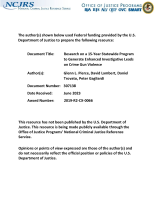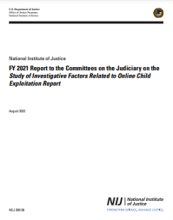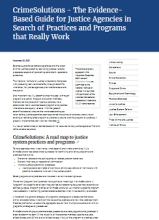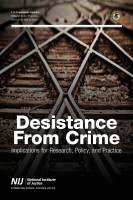Crime reduction
Perceptions of White-Collar Crime Seriousness: Unpacking and Translating Attitudes into Policy Preferences
What Works to Reduce Violent Gun Crime in Focused Deterrence Initiatives? Estimating the Effect of Services and Enforcement in Facilitating Desistence Among Prolific Violent Offenders
A longitudinal quasi-experimental study of violence and disorder impacts of urban CCTV camera clusters
Research on a 15-Year Statewide Program to Generate Enhanced Investigative Leads on Crime Gun Violence
Citizens' Reactions to Hot Spots Policing: Impacts on Perceptions of Crime, Disorder, Safety, and Police
A Longitudinal Quasi-Experimental Study of Violence and Disorder Impacts of Urban CCTV Camera Clusters
The District of Columbia Mayor’s Focused Improvement Area Initiative: Review of the Literature Relevant to Collaborative Crime Reduction
Examining Models of Law Enforcement Crime Information Centers for Sustained Organizational Change
What works to reduce violent gun crime in focused deterrence initiatives? Estimating the effect of services and enforcement in facilitating desistence among prolific violent offenders in Tampa
FY 2021 Report to the Committees on the Judiciary on the Study of Investigative Factors Related to Online Child Exploitation Report
Breaking Away From Broken Windows: Baltimore Neighborhoods and the Nationwide Fight Against Crime, Grime, Fear, and Decline
Controlling Street-level Drug Trafficking: Evidence From Oakland and Birmingham
Relations Between Criminal Investigation Strategy and Police Management
An Evaluation of Compstat's Effect on Crime: The Fort Worth Experience
Volunteering To Be Taxed: Business Improvement Districts and the Extra-Governmental Provision of Public Safety
Multilevel Evaluation of Project Safe Neighborhoods
Project Safe Neighborhoods (PSN) is a DOJ-sponsored initiative to reduce violent crime, particularly gun crime, by fostering cooperation by criminal justice agencies and local partners to develop and implement strategic approaches.
See the YouTube Terms of Service and Google Privacy Policy
NIJ-Funded Research on Firearms Violence in Urban Cities Advancing Scientific Evidence to Inform Practice
In this full thematic panel, renowned experts will present a series of papers summarizing the newest findings of NIJ-funded research projects on criminal offenses with firearms in urban areas. Researchers used various criminological and other theories, including routine activity theory, socio-ecological and socio-environmental perspectives, and advanced mixed-study methods, including surveys and spatio-temporal designs, to produce scientific evidence to inform practice.
See the YouTube Terms of Service and Google Privacy Policy
CrimeSolutions - The Evidence-based Guide for Justice Agencies in Search of Practices and Programs that Really Work
Desistance From Crime: Implications for Research, Policy, and Practice
Most scholars would agree that desistance from crime – the process of ceasing engagement in criminal activities – is normative. However, there is variability in the literature regarding the definition and measurement of desistance, the signals of desistance, the age at which desistance begins, and the underlying mechanisms that lead to desistance. Even with considerable advances in the theoretical understanding of desistance from crime, there remain critical gaps between research and the application of that research to practice.
See the YouTube Terms of Service and Google Privacy Policy







